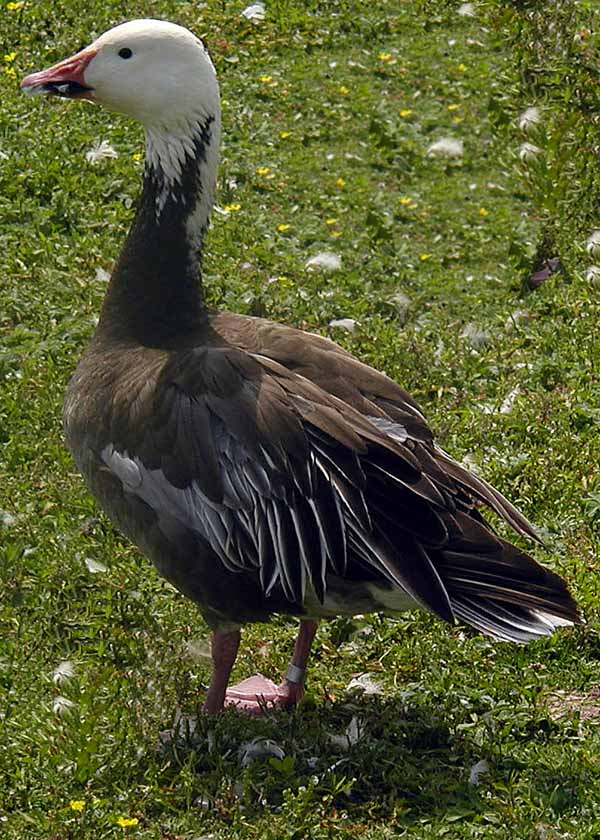|
| Query: Greater white-fronted goose | Result: 25th of 53 | |
Snow Goose (Chen caerulescens) - Wiki
| Subject: | Snow Goose (Chen caerulescens) - Wiki
| |

| Resolution: 600x840
File Size: 132019 Bytes
Date: 0000:00:00 00:00:00
Camera: C3100Z,C3020Z (OLYMPUS OPTICAL CO.,LTD)
F number: f/2.8
Exposure: 10/8000 sec
Focal Length: 191/10
Upload Date: 2008:01:07 09:45:30
|
Snow Goose
From Wikipedia, the free encyclopedia
Order: Anseriformes
Family: Anatidae
Synonyms: Anser caerulescens
[Photo] Blue morph Lesser Snow Goose (Chen caerulescens caerulescens) at Slimbridge Wildfowl and Wetlands Centre, Gloucestershire, England. Taken by Adrian Pingstone in June 2003. This image has been released into the public domain by its author (http://commons.wikimedia.org/wiki/User:Arpingstone).
The Snow Goose (Chen caerulescens) is a North American species of goose. Its name derives from the typically white plumage. The genus of this bird is disputed. The American Ornithologists' Union and BirdLife International for example place this species and the other two "white" geese in Chen, while some other authorities place it in the more traditional "grey" goose genus Anser.
This goose breeds in northern Canada and the northeastern tip of Siberia, and winters much further south in the continent in the southern USA and beyond.
This species is a rare vagrant to Europe, but a frequent escape from collections and an occasional feral breeder. For example, Snow Geese are rare visitors to the British Isles where they are seen regularly among flocks of Barnacle, Brent and Greenland White-fronted geese. There is also a feral population in Scotland from which many vagrant birds in Britain seem to derive. In Central America, vagrants are not infrequently encountered during the winter months.
Description
The smaller of the two subspecies, the Lesser Snow Goose (Chen caerulescens caerulescens), lives from central northern Canada to the Bering Straits area. It commonly occurs in two plumage morphs. White-morph birds are white except for black wing tips, but blue-morph geese have bluish-grey plumage replacing most of the white except on the head, neck and tail tip. White- and blue-morph birds do interbreed and the offspring may be of either morph. The larger subspecies, the Greater Snow Goose (Chen caerulescens atlanticus), nests to the north of eastern Canada. Blue-morph birds are rare among the Greater Snow Geese.
Ecology
Snow geese mainly eat plant material found in shallow water or on land. Outside of the nesting season, they usually feed in flocks. In winter, snow geese feed on left-over grain in fields. They migrate in large flocks, often visiting traditional stopover habitats in spectacular numbers.
Their nests are usually located in a slightly elevated location on the ground, built with plant material and lined with down. They mate for life.
The population of Greater Snow Geese was in decline at the beginning of the 20th century, but has now recovered to sustainable levels. Snow Geese in North America have increased to the point where the tundra breeding areas in the Arctic and the saltmarsh wintering grounds are both becoming severely degraded, and this affects other species using the same habitat.
http://en.wikipedia.org/wiki/Snow_Goose
| The text in this page is based on the copyrighted Wikipedia article shown in above URL. It is used under the GNU Free Documentation License. You may redistribute it, verbatim or modified, providing that you comply with the terms of the GFDL. |
|

|

|

|
Greater white-fronted goose
25/53 |

|

|
^o^
Animal Pictures Archive for smart phones
^o^
|
|

